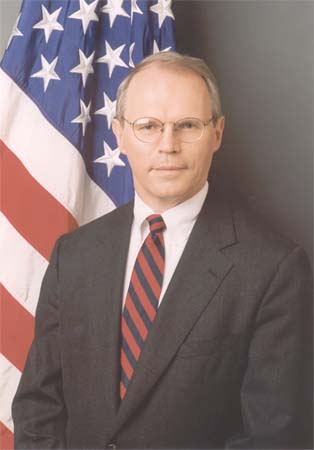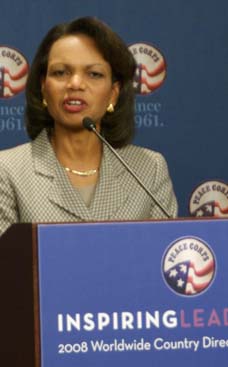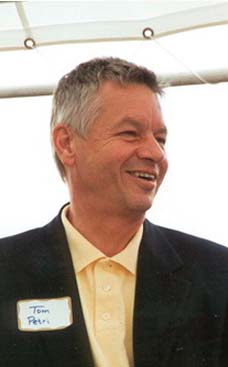
Critics of the talks say they are a form of appeasement, but for the Bush administration an agreement with North Korea may be its best hope for a tangible foreign policy achievement. "Christopher Hill has been critical [to the success of the policy towards North Korea] in that he is a very experienced negotiator who very much wants a deal, he has experience negotiating in the Balkans, the Dayton accords in the 1990s. He is very focused on getting from here to there," says David Sanger, the New York Times' chief Washington correspondent. "He managed to take a situation where Condoleezza Rice was willing to change policy and be able to push that and run with it against a group of now-defeated neo-cons within the administration," he adds. Christopher R. Hill, assistant secretary of state for East Asian and Pacific Affairs and former U.S. ambassador to South Korea, served as a Peace Corps Volunteer in Cameroon.
Christopher Hill has been critical to the success of the policy towards North Korea
Bush hopes for North Korea legacy
By Kim Ghattas
BBC News, Washington
President George W Bush refuses to use the word "legacy", but he is clearly thinking about it.
During his trip to Europe two weeks ago, he sounded very different from the man who was ready to go it alone on Iraq in 2003.
"One of the things that I'll be leaving behind is a multilateralism to deal with tyrants so problems can be solved diplomatically," he said during a press conference.
In his comments he was referring to Iran - but also to North Korea.
The US is intensifying negotiations with the government in Pyongyang about its nuclear disarmament, as part of the six-party talks involving the two Koreas, China, Japan, Russia and the US.
There has been a flurry of diplomatic activity in the last few days, with reports that North Korea may soon hand over a declaration detailing all of its nuclear activities, as a prelude to dismantling its nuclear programme.
Pyongyang has already announced it will blow up the cooling tower of its Yongbyon nuclear reactor this week.
Key player
It is all a far cry from 2002 when President Bush included North Korea in his "axis of evil".
But one event and one man helped change the administration's position
When Pyongyang shocked the world by detonating a nuclear bomb in October 2006, Christopher Hill - the State Department's point man on Asia - began travelling regularly to North Korea.
Christopher Hill
Christopher Hill has no plans to be in North Korea this week
"When you try to negotiate with them, you do so in the face of a lot of people who say 'why are we negotiating with people who have not kept their promises in the past?'," said Mr Hill during a recent podcast with Christopher Lyndon from Brown University's Watson Institute.
"But if giving speeches in Washington could solve this, we would just stay in Washington and give speeches," he added.
In return for giving up its nuclear programme, North Korea will get diplomatic and economic aid.
Critics of the talks say they are a form of appeasement, but for the Bush administration an agreement with North Korea may be its best hope for a tangible foreign policy achievement.
"Christopher Hill has been critical [to the success of the policy towards North Korea] in that he is a very experienced negotiator who very much wants a deal, he has experience negotiating in the Balkans, the Dayton accords in the 1990s. He is very focused on getting from here to there," says David Sanger, the New York Times' chief Washington correspondent.
"He managed to take a situation where Condoleezza Rice was willing to change policy and be able to push that and run with it against a group of now-defeated neo-cons within the administration," he adds.
'No baggage'
Mr Hill was not an expert on the issue - a positive factor according to Victor Cha, a former Asia director at the National Security Council and now a professor at Georgetown University, who was Mr Hill's deputy at the talks in 2006.
"He did not have the baggage or hang-ups of others who tried before him, he was hand picked by Rice. Overall, the negotiating team that was put together for the six-party talks was a very good team and there was good cooperation between the team, the State Department and the White House," said Professor Cha.
There has already been progress: Pyongyang has shut down its nuclear reactor, disabled key facilities and provided some 18,000 pages of technical logs of work done at the Yongbyon reactor since 1986.
But it missed a December deadline to provide a key document - a full and complete declaration of all its nuclear activities, from plutonium stockpiling to uranium enrichment and proliferation.
The interior of a cooling tower at the Yongbyon nuclear reactor in North Korea
North Korea says it will soon demolish the cooling tower at Yongbyon
"I think we are not headed in the right direction. For the first time you see agreement between people who I would characterise as very conservative and people who I would characterise as extraordinarily left-wing on whether this has been a good deal and the answer is probably not," said Danielle Pletka from the American Enterprise Institute, a right-leaning think-tank in Washington.
What is infuriating critics of the talks is that the administration now seems to be focusing mostly on North Korea's plutonium production and backing off on demands that it disclose its uranium enrichment and proliferation activities as part of the declaration.
There have also been accusations that the administration left Congress in the dark about Israel's strike against an alleged North Korean nuclear reactor in Syria last September, out of fear lawmakers would undermine its attempt to reach a deal with Pyongyang.
"If they do reach any kind of agreement with the six-party talks or some other kind of agreement, it will be much harder for them to go through Congress and get these agreements approved because they have really damaged the relationship between Congress and the administration," said Republican Congressman Pete Hoekstra in April, after administration officials briefed Congress about the strike.
Judgement of history
Those opposed to a deal with North Korea argue that the Bush administration, desperate for a foreign policy success, sees North Korea as the only achievement within reach.
"In their own minds or at least the mind of the Secretary of State, who's really been at the forefront of this, there's been very little success, nothing for the history books," says Ms Pletka.
"So the administration hopes that if it pretends there's an agreement with Korea and everybody says there is an agreement then maybe history will judge [it] kindly."
Victor Cha does not believe that the administration is ready to sell out for any deal, but insists that the proof will be in the pudding - it will all come down to the verification process.
But even then, there are doubts about the parameters for success.
"I think the strongest argument they can make for success is that they created something in the six-party talks that could have lasting value," said Mr Sanger from the New York Times.
"If the [negotiating] structure remains... there might be something lasting that comes out of it, but it may be a lasting process rather than disarmament of North Korea," he adds.
Meanwhile, Christopher Hill continues to shuttle back and forth between Washington and Asia, still hoping for a deal.
The State Department though insists there are no plans for him to go to North Korea this week.
"Dealing with the North Koreans over the years, when you look at all the failed negotiations, it's like the proverbial fifth marriage - a triumph of hope over experience," Mr Hill said in his podcast.
The fifth marriage may be in sight now with all the diplomatic flutter and the demolition of the Yongbyon cooling tower.
Other members of the six-party talks have been hinting that they may accept an incomplete declaration for the sake of easing the stalemate, but this will add fuel to the arguments of those opposed to the pursuit of a deal with Pyongyang.
There is always the chance of an upset - there have been many in the past - and President George W Bush will likely face stiff resistance in Congress, especially when it comes to removing North Korea from the list of states sponsoring terrorism.
But he is also clearly preparing to include North Korea on his list of foreign policy successes.









